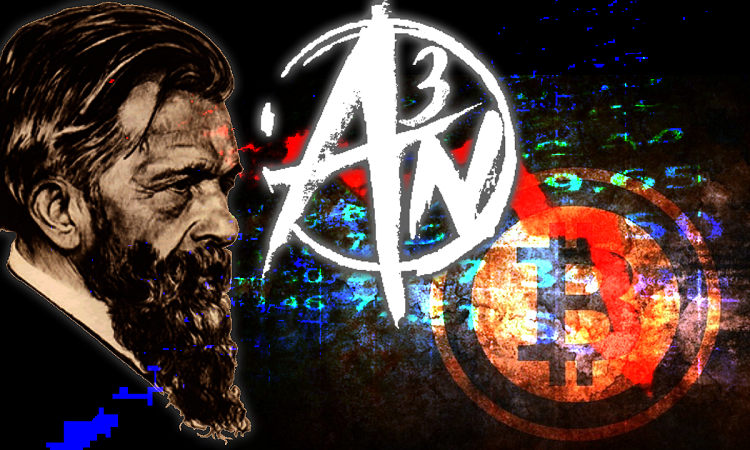
Menger’s Money: Without Agorist Action, Bitcoin Is Dead
No, this isn’t another salty Peter Schiff article about why bitcoin is going to zero, with victorious Davy Crockett goldbugs hopping about in coonskin caps proclaiming they told us so (though admittedly, such a future might be entertaining). This article is about one simple fact: without daily, permissionless use as money, bitcoin will soon be dead in the water. A sitting duck for all kinds of statist financial manipulations. Not because the tech is bad. Not because it can’t be money. But because there is not enough agorist action and counter-economic spending.
Financial Institutions vs Satoshi
The words are holy canon now: “A purely peer-to-peer version of electronic cash would allow online payments to be sent directly from one party to another without going through a financial institution.” So proclaimed Nakamoto Satoshi, as he (or she) conceived of the most innovative economic discovery in centuries — bitcoin — virtually immutable, decentralized money. Let’s pause at those last six words, too, because that’s where the magic is: without going through a financial institution.
If we take a look at what’s going on with BTC today, a glaring issue presents itself. Contrary to when this whole, so-called crypto revolution started, the idea seems now to be that bitcoin BTC is ‘digital gold,’ and that to spend it is silly. Indeed, with tx fees as high as they are on the network, to spend BTC daily for payments and get robbed of so much value is silly, and that’s too bad. Nobody is spending it like they did when it was an inspiring, nascent creation. In fact, as of last summer blockchain analysis group Chainalysis revealed what most already knew: about 60% of the mined BTC is just sitting there, and financial institutions wield a great deal of control over that which is moving.
As the report details:
“Roughly 60% of Bitcoin that is not lost is held by a licensed custodial service, or as FATF would refer to it, a Virtual Asset Service Provider (VASP). Most cryptocurrency exchanges would fall into this category, along with hosted wallets … The dominance of VASPs becomes even clearer when we consider that, of the remaining 40% of available Bitcoin, which is not currently held by VASPs, 87% has passed through a VASP at some point. Most people either hold their Bitcoin on VASPs, or acquire their Bitcoin from VASPs.”
While BTC indeed allows people the option of avoiding financial institutions, when it comes to the flow of this ‘digital gold,’ centralized financial institutions dominate. As crypto newbs are all too aware, just to get into the market via one of these exchanges often requires little less than a promise to deliver one’s firstborn child, a KYC scan of their bloody soul, and sworn agreements to file taxes with the state. Combine this with a hubristic, I-hate-everything-that-isn’t-BTC-because-reasons dogmatism, and the stage is set for Satoshi’s initial idea to be buried completely.
Real Money Must Be Spent Without Permission
“What is needed is an electronic payment system based on cryptographic proof instead of trust, allowing any two willing parties to transact directly with each other without the need for a trusted third party.” Again, Saint Satoshi. Interestingly, minus the ‘electronic’ part, this is exactly how money originated in the first place. Money was not the centralized creation of a state, or centralized financial institution, but a human tool born of necessity across the world, at different times, in decentralized fashion.
Money overcomes that difficult problem of needing something, but not having what the other person needs. For example, “I want to trade my friend some valuable baseball cards for his computer, but he doesn’t have an interest in baseball cards, and can’t be troubled to re-trade them for something else he does want.” With money, a universal unit of value is introduced so that my friend’s interest in or knowledge of baseball cards is irrelevant. He can take my money for the computer and then buy something he likes.
Money is, as founder of the Austrian School of economics, Carl Menger defines it: the most ‘saleable’ good. That is to say, the good that is easiest to sell in a given market. It’s something everybody values which can be traded easily, its value being more or less universally accepted and recognized in that market.
Gold, which historically began as a barter good commodity, would soon become the most saleable good in world markets, and eventually wind up as the leading SoV (Store of Value) asset. The reason gold became such a powerful SoV in the first place was due to its universal, daily use in markets. In other words, gold’s purchasing power became something that could be safely relied upon across time, and thus SoV status was achieved.
The problem then with BTC and other crypto is confused, and two-fold. Most holders now ignore the idea of market saleability, skipping directly to SoV braggadocio and outright rejection of use in daily payments, while simultaneously supporting the same third-party financial institutions that commandeer and stifle BTC’s ability to develop a true SoV status through global, daily, permissionless transactions.
BTC is valuable now. There is no doubt. What is called into question is the basis of that value, as well as its sustainability. If the appeal of BTC is merely that it’s worth a lot of fiat dollars (unreliable, inflationary currency) without its own independent, established market saleability, then it stands to reason when the bottom drops out of fiat, BTC will go right along for the evil ride (tuck the boner, Peter Schiff). This goes for any and all crypto. Without daily use in payments, savings, micropayments, and trade, it’s dead. Just a kind of casino for the fiat markets where folks can win big, but no true revolution or freedom is achieved.
Agorist Action Is the Answer
I got into bitcoin when I heard Roger Ver talking about its ability to starve the state — to make it impossible for countries to wage war via taxes. I felt an amazing feeling I had never had before. One, I was inspired. Two, it was a money I immediately understood on a gut, foundational level.
Unlike the stock market, endless tax forms, student loan fine print, complicated insurance agreements, tedious banking procedures, and endless credit dependency I knew all tied back to the Fed’s inflationary pyramid scheme, crypto didn’t make me hate myself for participating. I remember earning my first tiny bit of BTC via a jobs for bitcoin post on Reddit. The feeling of ownership I felt over that money was nothing less than thrilling. It was mine. And it was clean. And it was simple. There was no goddamned fine print. I felt human again. There was a real, palpable dignity there.
It matters not what you think of Ver, his championed bitcoin cash, or any other currency, crypto, or money. What ultimately matters is action, and that’s all there is to it. Speaking of BCH and action, transactions have recently surpassed those on the BTC network. Looking at the basic ethos of the community it’s not hard to see why. Bitcoin cash enthusiasts have a shared, general mantra: spend it, use it, save it, make it flow. In other words, take action. Further, there is a strong anti-coercion ideological thread running through the community, a distaste for state and regulatory interference, and a solid understanding that without financial sovereignty for the individual, there is ultimately nothing.
As Konkin said in his New Libertarian Manifesto:
“We are coerced by our fellow human beings. Since they have the ability to choose to do otherwise, our condition need not be thus. Coercion is immoral, inefficient, and unnecessary for human life and fulfillment. Those who wish to be supine as their neighbors prey on them are free to so choose; this manifesto is for those who choose otherwise: to fight back.”
Fighting back is indeed the answer for those wishing to be free. Where bitcoin is concerned, the type of fight is non-violent, counter-economic action. If action is not taken now, the state will only become stronger. Think how strange this is: choosing to directly transact with my neighbor instead of going through a financial institution has come to be viewed as a scandalous idea. People balk and recoil at the mere thought of not reporting personal economic exchanges to complete strangers they have not even contracted with in the first place. The religion of statism has so thoroughly washed the minds of the masses, that to even conceive of freedom in money literally hurts their heads.
Agorist action always involves some degree of risk, but without this risk being taken, bitcoin is ultimately doomed to be a fiat-tied token system and little more. This is not to say there’s something wrong with self-interestedly playing the centralized casino. That can be beneficial. This is only to state the obvious: without action in the market, there is no revolutionary or freedom-enhancing aspect to bitcoin.
If you cannot readily buy things with your crypto at any time, without sacrificing privacy…
If you cannot trade directly with friends, accept bitcoin at your business however you want, or conceal transactions…
If you must seek approval of state-licensed entities to hold, exchange, or deploy bitcoin’s value…
If bitcoin isn’t at least as easy to use as those greasy fiat bills lining your wallet…
If bitcoin doesn’t provide an avenue to explore black and grey markets, escaping the violence of the state…
If it’s always going to be dependent on the USD…
What. Is. The. Point.
To make a quick killing? Sure. Great. Fine. But please stop pretending that’s some kind of financial revolution. You’d be better served — and this is not a joke at all — grabbing your whisky and musket and joining Peter Schiff and the goldbugs at the hoedown. At least they have some basic understanding of sound money, trade, and value. For the rest of us who like both crypto and gold, and most importantly freedom, it’s time to take action, and use the stuff however we damn well please.
If we don’t, the coercion and centralization of everybody’s favorite decentralized money will continue, until to transact outside licensed financial institutions at all will become completely criminalized. Bitcoin needs massive adoption. And it needs it now. The way to get there is permissionless use. Otherwise, Satoshi’s whitepaper might be better put to use as toilet paper in the not-so-distant future.









